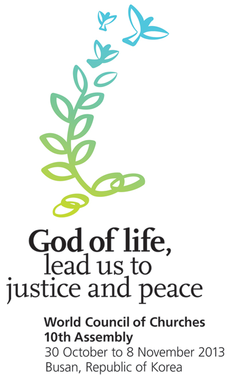Peace Train takes a journey towards reunification of Koreas

Rev. Dr Kim Young Ju (center) giving the benediction at the Peace Candlelight Prayer Vigil in front of Brandenburg Gate in Berlin, Germany. © ELKB/ChBreit
11 October 2013
A Peace Train has recently started its journey from Berlin, Germany through Russia and China to northeast Asia and the World Council of Churches (WCC) 10th assembly in Busan, Republic of Korea.
The train, which aims to raise awareness about the 60-year division of the Korean Peninsula, will travel through Moscow, Irkutsk, Beijing, Pyongyang and Seoul, and will finally arrive in Busan around the beginning of the assembly on 30 October.
The Peace Train is a project of the National Council of Churches in Korea (NCCK) and the Korean Host Committee for the WCC assembly.
Some 130 people from around the world are travelling on the Peace Train and include church and civil society representatives. They will arrive in Busan on 28 October and share their experiences at the WCC assembly. The theme of the assembly is “God of life, lead us to justice and peace”.
The train will highlight the importance of achieving peace on the Korean peninsula, cooperating with the churches of those countries which participated in the division of the Korean peninsula in 1953.
As part of this project, a seminar on “Religious Communities for Justice and Peace” has been organized in Moscow, the second stop of the Peace Train. The event was held in collaboration with the Russian Orthodox Church on 11 October.
WCC staff including Dr Guillermo Kerber, the WCC programme executive for Care for Creation and Climate Justice, and Dr Mathews George Chunakara, director of the WCC’s Commission of the Churches on International Affairs, addressed the seminar.
Kerber expressed “heartfelt appreciation” on behalf of the WCC for the efforts of the NCCK and the Korean Host Committee in coordinating the Peace Train project. He said, “Being confronted by overwhelming crises, churches and religious communities must overcome their divisions, speak out and react as an expression of their commitment to life, peace, justice and love.”
“A pilgrimage is always a transformative experience. May the Peace Train transform your lives, our lives, the lives of all of those going to the assembly,” Kerber added.
Catherine Christie from the NCCK and the Presbyterian Church in the Republic of Korea, herself a traveller on the Peace Train, shared how Bible studies and discussions during the journey are a transformative experience. She said that many people in our world “suffer because of the corporate sin in our world – suffer from militarism, national hostilities”.
“This group, made up of people from some African nations, India, Korea, European nations, Australia, New Zealand, North America and Brazil,” creates “a variety of perspectives and wisdom,” added Christie.
In Berlin, where the Peace Train commenced its journey, several programmes were organized by the German churches. One of these was the Peace Candlelight Prayer Vigil which took place in front of Brandenburg Gate on 7 October. Among the speakers were Rev. Dr Konrad Raiser and Rev. Dr Kim Young Ju. Around 120 people from 15 countries participated in the event.
The divided Korean peninsula is steeped in decades of pain and sadness (WCC news release of 2 October)




